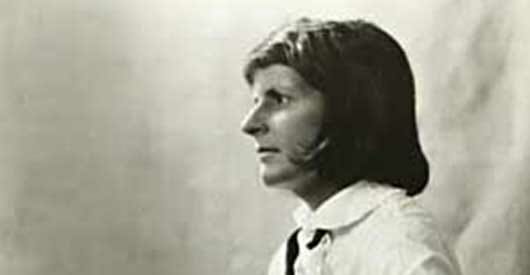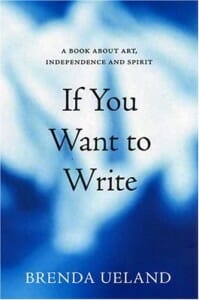
Ed: A slightly different version of this review of one of my favorite books on writing appeared earlier this year on World’s Strongest Librarian.
If You Want to Write: A Book About Art, Independence and Spirit was originally published in 1938, and revised in a second edition in 1983. And even though this book is over 70 years old, I want to say up front that I think it’s the best short book on writing that I’ve ever read. In fact, I defy you to read this book—barely 160 pages—and not come away a better writer. And a better person.
I encountered this book in a writing workshop, where we were learning to practice freewriting. Brenda Ueland’s book kicked my whole approach to freewriting into another gear.
If you love the way that writing isn’t really about writing at all, but about finding the truth in your life, then you will love this book. Brenda Ueland wants to teach every person she can to “free your thoughts and the genius that is in you.” She wants to show you how useful it is for writers to be idle, to let your imagination stretch its wings.
When you read the book, you don’t feel like you’re listening to Brenda talk to her students at the YMCA in Minneapolis 50 years ago, or in Greenwich village, where she was part of the Bohemian writers. No, she seems to be in the room, whispering in your ear. Sometimes her voice comes right out of your own heart. She is telling you things you already know, but which you had buried under the need to make a living, or not appear to be a fool, or because you thought you were stupid or untalented. But Brenda Ueland knows better.
Big, Slow Ideas
She is a fan of big, slow ideas. The kind that take time to develop, the ideas that anyone can have, yet few ever put down on paper. She knows, absolutely, that you have an authentic story to tell that no one else in the world could hope to get right, only you. She wants you to tell THAT story, in your own words.
Ueland knows about creativity, about how to quiet the monkey mind of doubt and disbelief, and how to open the door to joy and creative energy. You can get an idea of the book from some of the chapter titles:
- “Everybody is Talented, Original and Has Something Important to Say”
- “Be Careless, Reckless! Be a Lion, Be a Pirate, When You Write”
- “Why Women Who Do Too Much Housework Should Neglect It for Their Writing”
You might get the idea that If You Want to Write is non-stop cheerfulness, but it isn’t. The author knows the difficulty of staring at a blank screen, the terror that writers sometimes feel.
“All people have in them this power to write greatly and well, when they express freely and carelessly what is true to THEM.”
Ueland teaches you how to do this in her book by showing you that’s it’s possible, as a writer, to simply get out of your own way, to stop “trying” to write and just let what you have to say come out, as messy as it wants to be.
The author shows this with lots of examples from the ordinary people who came to her classes. Carl Sandberg called this book “the best book ever written about how to write.”
In a recent introduction Andrei Codrescu said the author “is one of those beings Allen Ginsberg called ‘Courage Teachers’ . . . her faith is contagious.”
Contagious is exactly the right word for the effect this book has on me. I cannot read it without actually feeling the current of energy that comes with inspiration of some kind rising up, demanding to be heard. Whether you think you’re a writer, or you think you aren’t, you should read it—you’ll be glad you did.
Photo of Brenda Ueland c. 1930 licensed under a Creative Commons Attribution 3.0 License, original work copyright by Minnesota Historical Society, https://www.flickr.com/photos/minnesotahistoricalsociety/



